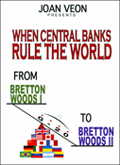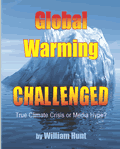NANOFOOD SECRECY: MANNA FROM HEAVEN OR FRANKENFOOD?
By
NWV News writer Jim Kouri
Posted 1:00 AM Eastern
January 11, 2010
© 2009 NewsWithViews.com
Scientists
throughout the world are claiming that Nanotechnology will take the
earth's food industries by storm, thereby changing the way food is produced
for human or animal consumption.
While scientists claim the benefits of Nanofoods -- foods produced using
nanotechnology -- are unmatched by any other technology, there are concerns
regarding what Americans will routinely put into their bodies for nourishment..
"Proponents of nanotachnology claim it will improve lives with
increased production and cost-effectiveness," said Dr. D.M. Becker,
a bio-chemist.
"In a world where thousands of people starve each day, increased
production alone is enough to warrant worldwide support. For the past
few years, the food industry has been investing millions of dollars
in nanotechnology research and development. But -- and it's a big but
-- I think research must be thorough and open before distributing nanofoods
to Americans," claims Becker.
Some of the largest food producers in the world are jumping on the nanotech
bandwagon, and hundreds smaller startup companies are expected to blossum.
But all is not rosy in the nanotech food industry despite the potential
benefits. There are still questions of safety and health and most Americans
aren't even aware of nanotech food applications.
The ongoing debate over nanofood
safety and regulations has slowed the introduction of nanofood products,
but research and development continue to thrive - though, interestingly,
most of the larger companies are keeping their activities quiet (when
you search for the term 'nano' or nanotechnology' on the websites of
Kraft, Nestle, Heinz and Altria you get exactly zero results).
Although the risks associated with nanotechnology in other areas, such
as cosmetics and medicine, are equally blurry, it seems the difference
is that the public is far less apt to jump on the nanotechnology bandwagon
when it comes to their food supply, said political consultant Mike Baker.
In the United
Kingdom, the House of Lords Science and Technology Committee report,
'Nanotechnologies and Food', claimed that the food industry was failing
to be transparent about its research into the uses of nanotechnologies
and nanomaterials, according to the European news media.
The London newspaper The Guardian alleges that the approach of food companies was to not publish or discuss details of its research, and while the food industry is right to be concerned about negative public reactions to developments in nanotechnologies, appearing to be secretive about its research “is exactly the type of behavior which may bring about the public reaction it is trying to avert”.
Responding to the Guardian report, Julian Hunt, FDF's director of communications, said, “Given that nanotechnology is in its infancy in the food and drink sector and that bringing new innovations to market is a long and complex process, we are surprised that the report seems to criticize the food industry for an apparent reluctance to communicate extensively on this subject."
“Understandably, there are many questions and unknowns about the potential future uses of nanotechnologies in our sector, and there is much work still to be done by scientists, governments and regulators, as well as the food and drink industry,” he is quoted as saying.
However, he added: “We support the report's recommendation for the formation of an open discussion group to bring more transparency that we know is important to consumers, indeed we are already engaged in such initiatives, both at UK and EU level.”
Because of the far-ranging claims that have been made about potential applications of nanotechnology, a number of serious concerns have been raised about what effects these will have on our society if realized, and what action if any is appropriate to mitigate these risks.
In the forefront of nanofood development in the United States is Kraft Foods, which took the lead when it created the Nanotek Consortium, a collaboration of 15 universities and national research labs. Kraft’s focus is on "interactive" foods and beverages. These products will be customized to fit the tastes and needs of consumers at an individual level. Possible products include drinks that change colors and flavors to foods that can recognize and adjust to a consumer's allergies or nutritional needs, according to a Kraft press release. Other large American-based companies, such as Nestlé and Unilever, are exploring improved emulsifiers that will make "food texture more uniform."
These huge Western companies are responsible for the bulk of the food industry’s research and development, however the nanofood industry is truly a global phenomenon and while U.S. lawmakers and government officials seem uninterested or ignorant of nanofood experimentation, Europeans seem to be questioning what they've characterized as "nanotechnology secrecy."
There are possible dangers that arise with the development of nanotechnology. The Center for Responsible Nanotechnology suggests that new developments could result, among other things, in untraceable weapons of mass destruction, networked cameras for use by the government, and weapons developments fast enough to destabilize arms races ("Nanotechnology Basics").
One area of concern is the effect that industrial-scale manufacturing and use of nanomaterials would have on human health and the environment, as suggested by nanotoxicology research within the private sector.
The report highlights “significant gaps” in the understanding of how nanomaterials impact on the human body, and that it is not currently possible to predict what risks specific nanomaterials may present.
It is now urging the government and research councils to adequately fund research into potential health and safety risks arising from the use of nanomaterials in the food sector.
The CRN recommends that the Food Standards Agency should maintain a publicly available register of food and food packaging containing nanomaterials, rather than the blanket labeling of nanomaterials, to help consumers make informed choices.
According to Dr. Becker, Nanotechnology, shortened to "nanotech", is the study of the controlling of matter on an atomic and molecular scale. Generally nanotechnology deals with structures of the size 100 nanometers or smaller in at least one dimension, and involves developing materials or devices within that size.
One nanometer (nm) is one billionth, or 10-9, of a meter. By comparison, typical carbon-carbon bond lengths, or the spacing between these atoms in a molecule, are in the range 0.12–0.15 nm, and a DNA double-helix has a diameter around 2 nm. On the other hand, the smallest cellular life-forms, the bacteria of the genus Mycoplasma, are around 200 nm in length.
To put that scale in another context, the comparative size of a nanometer to a meter is the same as that of a marble to the size of the earth. Or another way of putting it: a nanometer is the amount a man's beard grows in the time it takes him to raise the razor to his face.
There has been much debate on the future implications of nanotechnology. Nanotechnology has the potential to create many new materials and devices with a vast range of applications, such as in medicine, electronics and energy production. On the other hand, nanotechnology raises many of the same issues as with any introduction of new technology, including concerns about the toxicity and environmental impact of nanomaterials, and their potential effects on global economics, as well as speculation about various doomsday scenarios. These concerns have led to a debate among advocacy groups and governments on whether special regulation of nanotechnology is warranted.
"Some
of the dangers described here are existential risks, that is, they may
threaten the continued existence of humankind. Others could produce
significant disruption but not cause our extinction.
A combination of several risks could exacerbate the seriousness of each;
any solution must take into account its effect on other risks,"
claims Baker.
"Some of these risks arise from too little regulation, and others
from too much regulation. Several different kinds of regulation will
be necessary in several different fields. An extreme or knee-jerk response
to any of these risks will create fertile ground for other risks. The
temptation to impose apparently obvious and simple solutions to problems
in isolation must be avoided. Other pages address the possibilities
for regulation; this one is concerned with discussing and analyzing
the dangers," he said.
Because there is little government oversight in this area, says Craig
Minowa, an environmental scientist for the Organic
Consumers Association (OCA), the public may have little to say about
it. "Products are not labeled, so consumers cannot choose to avoid
them," he explains.
The OCA, a grassroots non-profit public interest organization based in the U.S., is one of many vocal organizations calling for government regulation on nanofoods, at least until more safety testing is completed. These organizations argue that a lack of evidence of harm is not the same as reasonable certainty of safety, which is what food companies must demonstrate to the U.S. Food and Drug Administration (FDA) before introducing a new food additive.
"The OCA is focusing its efforts on educating the public about the potential risks of nanofoods and putting pressure on government agencies to increase oversight," says Minowa, adding that ever-tightening federal budgets, at least in the U.S., will make the latter a huge challenge.
|
Subscribe to the NewsWithViews Daily News Alerts! |
"There’s a lack of consumer understanding, a lack of government oversight and a lack of labeling," says Minowa. "Combine these with a lack of testing and you have an equation for serious problems.”
© 2010 NWV - All Rights Reserved

















